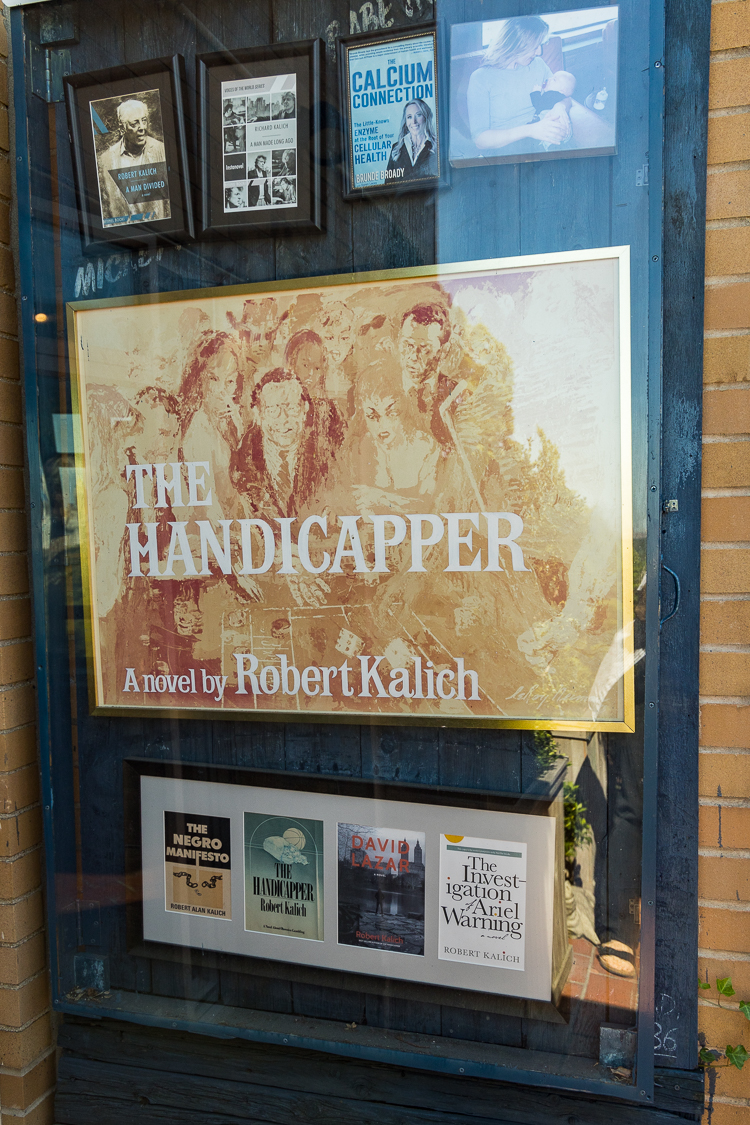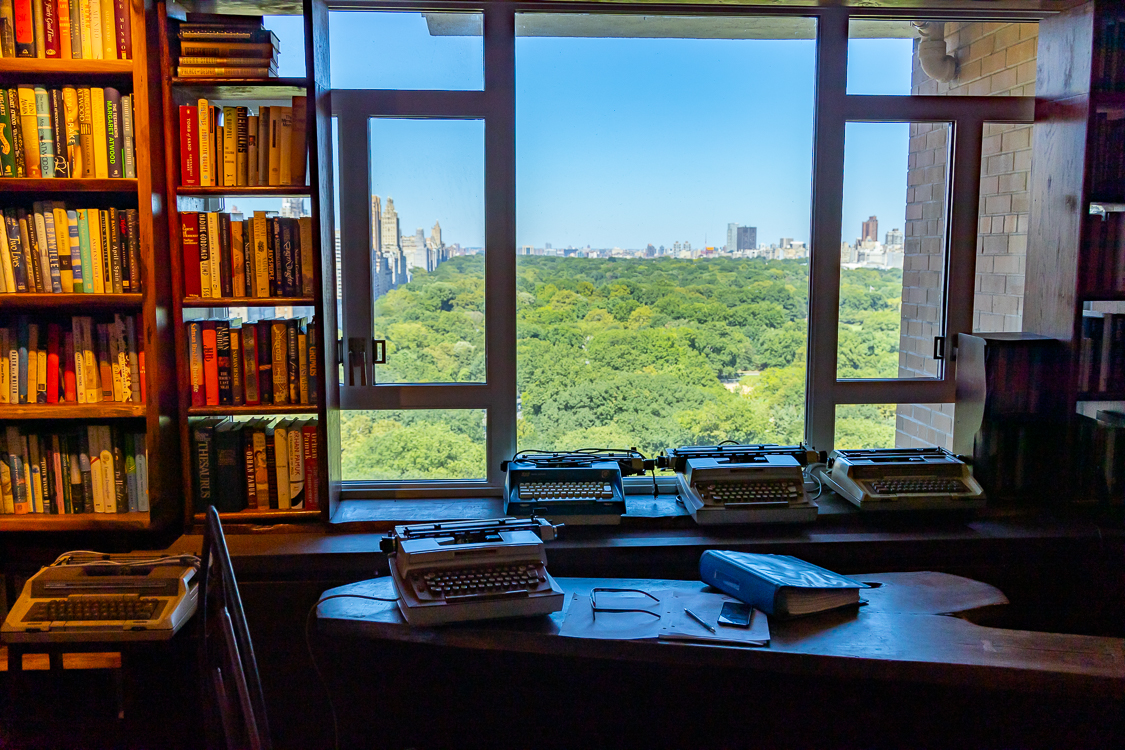
by Daniel Krieger
Many years ago, at the age of 33, Robert Kalich hit a bad losing streak. He was dead broke. He was in debt $40,000 from gambling. He was stuck in a toxic marriage to a woman he couldn’t get along with but couldn’t keep his hands off of. Nothing was working out. And it was the one and only time in his entire life that he moved away from the Upper West Side to the Upper East Side, which he hated. Then his wife threw him out and he moved in with his parents on West End Avenue. Heartbroken, he decided he was going to show her he could make it.
“I was a degenerate until I was 33,” he says, matter-of-factly, during a recent interview. But 33 was a turning point. That was when he figured out how to break the losing streak thanks, Kalich says, to his burning ambition, a deep understanding of basketball and his facility with numbers.
Leaning back in a carved wooden chair in his rent-stabilized Central Park South penthouse, where he’s lived since 1972, Kalich talks openly about his charmed and exuberant life. He is now 85, with a paunch and a full head of slightly disheveled white hair. He’s wearing a Georgia Tech T-shirt, Adidas sweatpants and black sneakers. The north-facing window of his 21st-floor apartment has a sweeping view of Central Park. Each room, the kitchen included, is lined with books, about 10,000 in total, all literature, from all over the world. Most of the furniture in the densely-packed (but very orderly) four-room space is built by the master craftsman Richard Rothbard.
Blunt, brash, sarcastic, plainspoken, playful and impatient with my ignorance, Kalich sounds like an old school ‘New Yawka’ dropping his r’s and taking little time for niceties. He’s what my mother, who grew up in Queens, would’ve called, “a real charactah.”

What else is Robert Kalich? He is a novelist whose fourth novel, a fictionalized memoir called “Impossible to be Human,” comes out in October, completing his auto-fiction trilogy that concludes the story of “The Handicapper” (1981) and “David Lazar” (2019). He is also a nonfiction writer of a half dozen books. He is a professional gambler — more specifically, a “handicapper.” And it was his genius at gambling that turned things around when he hit rock bottom. By studying and analyzing college basketball in order to gain an edge, which is what a handicapper does, he cracked the code and began winning at gambling, creating a lucrative industrial-size operation, he says.
“I’ve had a big life,” he says, surveying his eight decades on earth. “And I never had a small ego. I wanted to own the city. I was as big as you get and I knew everybody.”
His friends in the 1960’s, 70’s and 80’s spanned a who’s who of luminaries in theater, film, government, sports, finance, real estate – you name it. He used to host summer parties with 150 guests on his 3,000-square-foot terrace; guests included the likes of Robert De Niro, Ed Koch, Barbra Streisand, Dick Barnett, Al Pacino, La Toya Jackson, Earl Monroe.
Kalich grew up on 106th Street and West End Avenue. His dad, Kalman Kalich, was a renowned cantor at the Ohab Zedek Synagogue on West 95th Street, but Kalich thought religion was “inane” and his dad an “ignoramus” who never got a proper education.
His mother was a professor of psychology at Barnard College, and it was she who raised Kalich and his identical twin brother, Richard, to be worldly men of letters in a household chock-full of culture. Kalich says he always wanted to be a novelist and from childhood read voraciously. “When I read Dostoyevsky,” he says, “I thought I could be Dostoyevsky.”
The Jewish enclave on the Upper West Side was a great place for a kid to grow up in the 1940s and 50s, he says, calling it “much more humane, not like today with the digital culture where you have nothing but alienation and spiritual impoverishment.”
After graduating from NYU, in 1960 he got a job at The Daily Mirror, a tabloid published by William Randolph Hearst. He started as a copy boy and moved up to obit writer. Then he covered nightlife, like Tony Curtis in the film, “The Sweet Smell of Success.” “I was Broadway Bob,” he says, “and I was getting to know the most gorgeous girls in the city. I loved that job.” But he quit shortly before the paper went under in 1963 and became a social worker in Harlem due to the demands of his first wife who wanted him to earn more money.
On two subjects, Kalich shows some modesty. The first is his twin brother, Richard, who is also a novelist and lives down the street. They talk several times a day and are, as Kalich puts it, two sides of the same coin — the same yet different. “All I can tell you about my fucking eccentric, neurotic, completely crazy brother is that there’s never a day I’m with him when I don’t learn something,” Kalich says. “He is the consummate intellectual. I’m not an intellectual like him. He is totally pure. Without any corruption. I’ve had nothing but corruption in my life since the age of 33.”
The second subject that he speaks of with modesty is his sixth wife, Brunde Broady, a philanthropist, businesswoman and writer who spends most of her time at their estate in North Salem, NY, in Westchester, where Kalich goes on weekends. They have a son, Knute, who studies at Georgia Tech. “When I met my wife, I was ready to settle down and live a domesticated life, to a certain extent,” he says. “The best 25 years of my life have been the past 25 years with her.”

Looking back on his eventful journey through life with its ups and downs, good fortune, twists and triumphs, Kalich is quite pleased with how things turned out. Standing on his terrace under the late summer sun, surrounded by abundant lush greenery and with the sprawling expanse of Central Park in the background, he turns to me and says: “I’ve had a great life, and you know what? I’d like to do it all over again.”









I want to hear more about this guy! He should do a talk with LandmarkWest! as he sounds like an UWS landmark himself.
You can’t leave us hanging like this! What’s the rent on that place???
Will he have a block dedicated to him?
Where do I find such a fabulous apt as described in Robert K’s “storied” ???
Would find it infinitely more interesting to hear how he got a rent controlled apartment on CPS, with a terrace.
Interesting. Touched a nerve here since his dad may have been the Cantor who may have officiated at the wedding of my parents way back in 1944 at Ohave Tzedeck, the synagogue on West End Avenue and West 100th Street.
The synagogue he mentioned is on 95th street not 100th street.
Correct. It was Anchai Chesed on West 100th St and West End Ave. Good catch. Funny because live a block away from Ohaiv Tsedek. Ugh. Don’t get old I tell folks. Thanks for the clarification.
Hey, reading that was fun!
Election season is coming up; I vote for more such fun articles. The people must speak; let NY speech, dropping r’s with wild abandon & rich with cackling & chortling ring the canyons and yes: may a line dance of confessions and boasts boogaloo & hokey pokey from the North River to the East!
I rest my case.
Only in NY can you have a multi-million dollar estate in Westchester and a rent-stabilized apartment with a park view!
Yes. Once someone gets a rent stabilized apt it doesn’t matter what their income or assets are. It’s a disgrace. So many people scam the system.
Rent stabilization isn’t only for the poor. It’s for everyone!
Now, if he’s not using the apartment as his primary residence, that’s a different story.
Agreed, it makes rent more expensive for the rest of us since we are subsidizing his rent. When he dies his philanthropist wife will get it! Remember David Koch had a rent stabilized apartment!
Your landlord would charge the exact same thing for your apartment regardless of how many stabilized units are in his portfolio. Honestly, if stabilization were abolished today, do you think the rent would come down? If so, I have a wonderful bridge acquisition opportunity for you!
Rent stabilization reduces the supply of market-rate apartments, thereby increasing their price.
Of course it does! His Rent has to be very low because it never went out of RS before the 2019 law changes. If you can afford a $4 million second home, he could probably afford and apartment in NYC. Maybe someone without money would like that deal.
First person I ever heard of who became a social worker for the money!!! Makes me doubt a great deal of this story.
But he had a glamor gig, which probably wasn’t very lucrative. He was just out of college.
V sad not to see the terrace. And grinding my teeth with other commenters at the rent stabilized place plus country house. Ah this city…but thanks for the character sketch.
Fabulous! West End Ave and 92 St since 77. Also rent stabilized. I’d like to do it all over again too!
Instead of protesting “greedy” landlords and developers as the source of NYC’s housing woes maybe we should protest wealthy people like this who live for decades in ginormous rent-stabilized apartments in luxury buildings while also having a second home in Westchester.
He has lived in the apartment since the 70’s live in your apt for over 40 years. Rent stabilization helps & protects tenants
Next do a Millenial family paying 40% of their income for a one bed room walk up.
Would these millennials have dared rent in the city back in the 70’s when he first signed his lease? If someone signs a lease and it’s in the document that the rent is a certain amount and it goes up only a certain amount, then that’s that. Get mad at the current rents, and the fact that average New Yorkers can’t afford them. Not the fact that someone signed a legally binding contract at the right moment at the right time. Further, I doubt the landlord/owner of this building is a mom and pop just making ends meet.
Doubt CPS was ever dangerous
To answer your question: how would you know? Second of all, the City is as crime ridden now as it was in the 1980s, if not the 70s. Thirdly, the other people in the building who don’t have rent stabilized apartments pay market rate and higher to compensate. In order to maintain a rent stabilized apartment, a person should have to meet lower income requirements.
Aren’t you usually the one saying you can’t argue with the law?
“Thirdly, the other people in the building who don’t have rent stabilized apartments pay market rate and higher to compensate.”
Do you genuinely think that the landlord has a maximum profit he’ll take on his building? If this unit came out of stabilization, the landlord would just jack up its price and not lower the other rents in the building to compensate. This is what happened to all the units pushed out of stabilization during the great era of landlord misconduct prior to 2019. Instead of having a building with two apartments renting for $1000 each and eight renting for $3000 each, you just get…a building with 10 apartments all renting for $3000 each.
Most of you folks own co-ops and there’s no need for you to be repeating landlord myths.
What’s an “OG”, as in the headline? I’ve read the article twice and don’t see that explained.
“Original gangster.” It means an old-school guy.
Entertaining guy, but I don’t believe much of what he says.